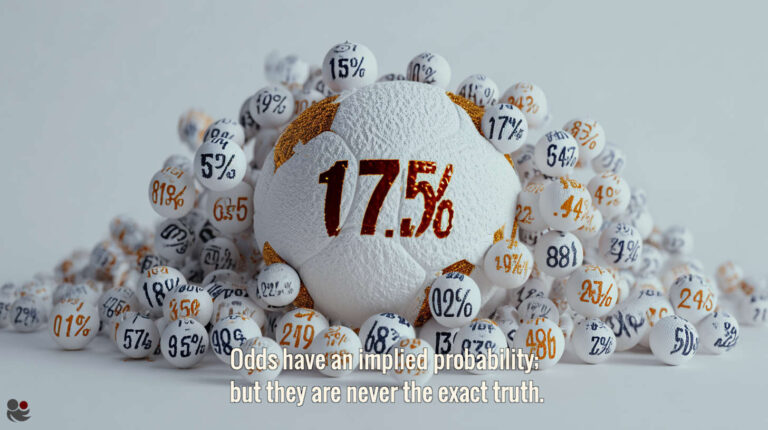
Everyone has a say on ‘form’ - but do you actually know what it means?
What exactly is understood by the term form when applied to teams in a football match?
The Illusion of Form – and What to Use Instead
The Value Calculator: A Case Study in Ignoring ‘Form’ (Mostly)
So the answer?
The reader will have to excuse our growing ignorance of the concept of form, but we dare to propose that the true meaning of the word is completely unclear – and misunderstood by many.
Soccerwidow has now been analysing and researching football and statistics for over 15 years and, in summary, the term form is both misleading and mysterious. Everyone talks about it, yet no one can quite put their finger on what it is.
This article therefore questions the concept of form, and we wish to encourage you to join the discussion in an effort to define and explain what is really meant by it.
FORM: The Favourite Word That No One Can Define ⤴️
The word form is tossed around by commentators, pundits, and punters as if it had a precise meaning. Yet when you look closely, its definition slips through your fingers.
Depending on who you ask, form can mean very different things:
-
A Harvard Sports Analysis blog once tried to formalise form.
‘Form‘ as a weighted sum of “points above expectation” (PAE) – the difference between actual and expected results (based on bookmakers’ odds) in recent matches, with greater weight given to more recent games.
That’s quantifiable – but pretty complex, and therefroe not widely used by casual punters.
(Source: Harvard Sports Analysis, 2015) -
Everyday usage:
If one speaks of ‘form‘, it usually refers to a team’s recent performance – typically over the last few games – and how well or poorly they’ve played, whether they are climbing up the league table or dropping down.
Applied to players, it means how closely they are performing relative to their perceived potential – for example, the goal machine who sometimes misses for weeks, but is said to be “in form” when scoring freely.
There is clearly no clear definition.
What none of the attempts to define ‘form‘ is taking into consideration is whether it was just a stroke of good or bad luck for the teams.
Or have you never had a few consecutive weeks (or even months) in your life when everything just went right – or wrong – for no obvious reason at all?
Going to the shop and just finding great bargains, speaking with the boss and getting an unexpected pay rise, meeting someone new and getting the feeling that you’ve known each other for eternity.
But how long will that lucky (or unlucky) strike last?
The Illusion of Form – and What to Use Instead ⤴️
So, is there a clear, universally accepted definition of form?
Not really. There’s overlap, yes, but no consensus. It’s more of a emotional shorthand than a technical one.
Everyone talks about form as if it were a solid, universal thing – but when you scrape away the surface, you find mush.
So what’s a punter supposed to do with that?
Voices from Soccerwidow’s Core Team
Forget ‘form‘. Treat it as a myth, or at best a mood word. If you rely on it, you’re feeding the bookmaker exactly what they price for – punter bias. The only sane move is to ignore ‘form‘ completely in your calculations and stick to hard data. If you want to win, stop paying for smoke.
Most punters won’t ditch it. Form is part of the fun: checking the tables, following streaks, believing in momentum. If you take betting as entertainment, there’s no harm in using form – it gives you a story to tell yourself. But don’t expect profits.
You can’t just ignore it, though. If a striker’s scoring every week, or a team looks like they’ve got their act together, you’d be daft not to notice. The trick is not to make it your only reason for betting. Use it alongside other stuff – odds, injuries, tactics. Think of form as a clue, not proof.
Form must be defined in terms of measurable deviation from expectation – like using PAE (points above expectation) or expected goals metrics. Without that, it’s a fog with no predictive value. Only when form is broken down into causality – tactical change, returning personnel, improved underlying metrics – does it become useful.
The rational approach is to reframe ‘form‘ as variance around expectation. When you see a streak, ask:
- Is this down to genuine structural change (tactics, line-ups, fitness)?
- Or is it simply a short-term fluctuation that will regress to the mean?
Unless you can link the ‘form‘ to an identifiable cause, assume it has little predictive value. The gambler’s task is to separate signal from noise.
It’s amazing how loudly people speak about ‘form’,
considering no one can actually explain it.
For me, form is just a narrative: something to keep fans engaged, something to argue about in the pub, to follow on the tables. All in all – just big business, built to entertain.
If you want a far grimmer example of how superficial indicators hide structural failures, see
Low‑Tier Match‑Fixing: The Shadow Wage System in Plain Sight.
The Value Calculator: A Case Study in Ignoring ‘Form’ (Mostly) ⤴️
One of Soccerwidow’s first products was the Value Calculator, and we used to receive regular enquiries asking whether we considered form in our match analyses and value bet recommendations.
At the time – in 2012 – we also published match reviews here on the website, as well as on the Betfair blogs in both, Germany and the UK.
Our approach to analysing matches and picking bets for the Value Calculator was as follows:
- Step 1: Historical results
We would take the historical results of the last 25 games of each team – that is, 25 home games if the team was playing at home, and away games if playing away – and combine these with the head-to-head results of both teams at that venue over at least the last 10 years, in order to compute initial odds.
- Step 2: Probability calculation
The probabilities of each betting option were then calculated – and form played no role at this stage.
- Step 3: Value bet selection
Once the probabilities of each event had been determined, we calculated what the corresponding odds should be, and compared them with the market odds. Only bets where the market odds and our own calculations diverged were selected.
- Step 4: Short-list
Usually, there were four or five potential ‘value’ bet candidates – but sometimes there were none (meaning that our odds calculations corresponded closely with the market), and only very rarely were there more than five.
- Step 5: Incorporating form
For making the final selections (the actual picks), incorporating an element of form became necessary.
We would look at the last six matches in more detail and consider against which teams those results were achieved – whether relatively weaker or stronger opponents.
We might also read a few current articles about the teams in general, such as injury news, suspensions, and so on, before finalising the short-list of bets that were deemed to hold value.
This approach seemed to work admirably, as the picks consistently returned a positive ROI – but whether our strategy considered form sufficiently remains an open question.
- Total Net Profit: 252.81 units
- Total Turnover (stakes risked): 2,166.77 units
- Average Yield: 11.67% (profit divided by turnover)
- Return on Investment (ROI) over the 7-month span: 505.63%, meaning the starting bank quintupled.
- Average Monthly ROI: 29.91%
So, while that monthly figure of nearly 30% is eye-catching, the overall yield across all bets is actually less than half that – just under 12% – reminding us once again that yield is not the metric to focus on.
So the answer? ⤴️
👉 Don’t trust form as a standalone input.
- If you’re betting for entertainment, use it as colour.
- If you’re betting seriously, only touch it when you can pin it to something causal (injury returns, tactical change, fixture strength).
Otherwise, you’re just buying into the same illusion as everyone else.
Feel free to share your view on what form means to you.
Thank you in advance for your valued opinions and contributions.








I really don’t like maths or statistics, but i like problem solving if i have my way around it. This is where betting comes in. I keep researching or try to develop a system to win consistently but not 100%. The game of online roulette is very challenging but with sites like moneymakermachine that develops and design software to test roulette strategies without risking a dime, i have hope that i will develop something that wins consistently. Like in the United kingdom i know genuine a tip site that offers sports and horse racing picks with consecutive wins of more than 14 and max losing runs of 3 for over so many years. Though most of the odds are odds on, but the soccer usually around 1.50 to 2.10, but on average 1.50 for most picks, which would be profitable with a martingale system, progression of 4 bets using a bank of $300 to make $150 every 30 days, but i want to reduce the risk and increase the payout. I know i will make a living from betting wisely. Treat it as an investment not gambling, even though it involves forecasting just like FOREX trading which is more distinguished compared to betting. Here on this site i know they make a living placing bet http://www.sportsbookreview.com the forum.
Hi again , more questions…
[[[[[2) we do predictions on any league/cup game where the last 25 results of both teams are available (e.g. the last 25 home results for the team at home and vice versa for the away team).]]]]
For example , Chelsea (home) vs Tottenham (away)
1ºSo you don’t take into consideration in this case games away from chelsea or tottenham at home , right?
(because some people
take into consideration when home team have played away and viceversa , some people take home & away into consideration , they put a “statistical weight” (e.g. 80% when chelsea has played at home , and 20% when chelsea has played away) in every match , maybe is not neccesary doing so , i dont know. probably there are different ways to analize games.)
2º Chelsea last 25 matches at home , but many matches was Champions league , FA cup , Tottenham away in Uefa cup , so , in previous
post you have said that you don’t take into consideration European cups , but you take into consideration domestic cups,
eg , chelsea in the last 25 matches , have played 17 in league 4 in champions league , 4 in FA cup , Do you take only 25 last
matches from premier league , or do you includes fa cup and carling cup between the last 25 matches?
3º in the last 6 matches in detail , you mean 6 last matches in overall? e.g. chelsea last 6 matches home & away? or just home matches from chelsea , and just away matches from Tottenham?
4º You have said that you have put Danish league into excel… Did you do it manually (time-consuming a lot) or did you copy & paste from some website(not so much work) ?
Three off topic questions:
Do you bet on Greyhound racing /Horse racing or other sport like Tennis , NBA or just in soccer?
Do you bet in traditional books , exchanges or both? , i have heard that traditional bookies put limits if you are a winner (and sometimes you can suffer nonpayments ) , this not happen in exchanges i think because theorically you bet against other users .
And the last question , maybe you dont want to answer this… Do you make a
living from betting?
Greetings and sorry because for my bad english , i understand english 80% but i use google translator when i want to write.
There are sometimes real ‘goldmines’ to be found on the Internet, no question.
Something challenging me is the correct score picks published by http://invarius.ivnet.ru/soccer/champ/champ.htm Sometimes the success rate is as high as 20 to 25% in one weekend. This is scary!
However, I have not yet succeeded to work out how the guy behind this site arrives at his/her predictions.
Well the parent site owner has been using this system secretly for more than the aforementioned month above. I am planning to me with the Goldmine site owner and the parent site owner, they both operate on same frequency and originally i feel the parent site owner is behind the system.I am working hard to know how this picks are made, but i guess they have some cogent stats information to protect.
http://footballcashbuilderpro.com/traders/progressing-htft/betfair-daily-earnings/
Hi James,
Thanks for sharing the link. I have had a quick look and it seems indeed that you have come across a “footballgoldmine” 😉
I read through the home page as well as the other forum threads and it seems that the approach of the website owners is exactly as I’m preaching in my blog: statistical – mathematical. They achieved with their ‘over 2.5 goals’ prediction a rate of 75% which is absolutely possible when applying statistical analysis to picks.
The ‘laying multiples of 3’ has now won for 30 days in a row and this is possibly a little bit of a lucky chance, but assuming that the picks are made picking games with probabilities of 30% and under to win, then the likelihood that all three bets win is 30% x 30% x 30% = 2.7% – this means that there will be no more than 3 multiples in 100 days which lose (hope this makes sense).
However, the website owners also write on their home page:
“Never bet what you can’t afford to lose.
Don’t try and be too clever!
Bet on what you know.
Beware of “hot insider tips” (It rarely exists)
Don’t bet on teams you are emotionally disposed to.
Base decisions on statistics combined with current news information”
I totally agree with every single statement, especially with “Only Bet on what you know!” Check out my course on Betting on Under / Over ‘X’ Goals
http://footballgoldmine.com/member/index.php/topic,57.30.html
Well i have being monitoring the picks and result on a site and for the past 2 months and some few weeks now haven’t lost even a single lay multiple bet on treble pick(Laying 3 teams to lose, wherein if only 1 out 3 loses you get back your stake). My curiosity is how they consistently make the right picks. The picks are posted before kickoff each day,mostly the night before.
Share the website please – I’m now curious.
ALSO REMEMBER YOU ONLY NEED 1 OF THE 3 TEAMS TO LOSE TO WIN YOU BET
Y. M KAYDARILL
Do you have a strategy or system to picks 3 teams that will lose daily, using betfair multiple lay system
James,
Sorry, no, we haven’t looked into such a system yet but it sounds interesting enough to investigate some time in the future. Let us know even if you have moderate success with any of your ideas and perhaps we can provide tweaks that turn good ideas into winning ones.
Best,
Soccerwidow
Hi Soccerwidow ,i have plenty questions but for today i have just 2 simple questions.
1º Do you use only excel to make the analisis or some other software is essential to keep better the analysis?
2º , Do you bets only in leagues provided by football data.co.uk (excel tables) or you create data base from more leagues (e.g. scandinavian soccer etc) not provided by football-data yet.?
greetings
Hi Panos,
1) yes, we only use Excel at the moment, as it does everything we need and is simple enough to use
2) we do predictions on any league/cup game where the last 25 results of both teams are available (e.g. the last 25 home results for the team at home and vice versa for the away team). We also use head-to-head results in our analysis where these too are available. Doing it this way is so much more time/cost effective and the accuracy of the predictions is pretty good at the moment in our Betfair articles on the English and German Betfair blogs.
I have put together a five year analysis of the Danish league (where statistics are not available from http://www.football-data.co.uk), but the time it took and the pain/suffering I endured were enough to tell me that I don’t need to do this exercise too often! Keeping something like this up-to-date is much easier than creating it from scratch!